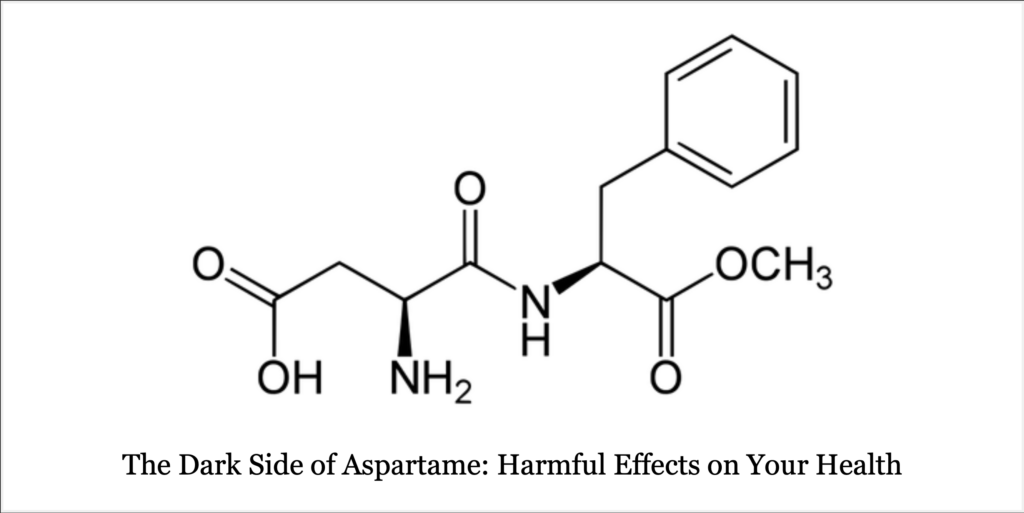Negative effects of Aspartame
One frequently used artificial sweetener in many food products is Aspartame, but its negative effects on health are often overlooked. Aspartame is a low-calorie sugar substitute that the FDA first approved in 1981. Despite its controversial history and numerous studies linking it to harmful health effects, it continues to be widely used.
Aspartame is popular among people looking to lose weight or manage diabetes. However, research has linked the consumption of Aspartame to various health problems, including headaches, digestive issues, and even cancer. This blog post will analyse the negative effects of Aspartame and why it is essential to be aware of its negative impact on our health.
The Negative effects of Aspartame on Health
Aspartame, a sugar substitute commonly found in diet drinks, has been controversial due to its potentially harmful effects on health. The negative effects of Aspartame on health have been widely studied and documented, with concerns ranging from headaches and migraines to increased risks of cancer.
One of the most prevalent effects of Aspartame is headaches and migraines. Research has shown that aspartame consumption can trigger headaches in some individuals, particularly those prone to migraines. Additionally, Aspartame has been linked to metabolic disorders, including insulin resistance and diabetes.
Neurological symptoms are also a potential risk associated with aspartame consumption. Studies have shown that high levels of aspartame intake can lead to symptoms such as dizziness, depression, and anxiety. There is also some evidence linking Aspartame to an increased risk of cancer, particularly brain cancer.
Other health issues associated with aspartame consumption include digestive problems, such as bloating and gas, as well as allergic reactions in some individuals. As such, it is crucial to be aware of the potential negative effects of Aspartame and to limit its consumption where possible.
Research Studies and Controversies Surrounding Aspartame
Aspartame has been a controversial topic for many years, with concerns about its negative effects on health being raised frequently. While the FDA has approved the use of Aspartame in food and beverages, some studies have shown that it can harm the body.
The approval process of the FDA for Aspartame has been heavily criticized. Critics argue that the approval process was based on flawed studies and that the FDA ignored the potential negative health effects of Aspartame. Despite these criticisms, Aspartame continues to be used in many foods and beverages.
There have also been criticisms of the studies conducted on Aspartame. Some have claimed that the industries funded the studies, and thus, the results may have been biased. This has led to concerns about the reliability of research surrounding Aspartame.
Overall, there is much controversy surrounding the use of Aspartame in food and beverages. It is crucial to consider the potential negative effects of Aspartame on health and to carefully weigh the research surrounding it.
Alternatives to Aspartame
Aspartame has been a popular choice for sweetening our food and drinks due to its low-calorie content. However, concerns about the negative effects of Aspartame on health have led many people to seek alternative sweeteners. Several options include natural sweeteners like stevia and monk fruit and artificial sweeteners like sucralose and saccharin.
Natural sweeteners are a great alternative to Aspartame as they are derived from plants and have zero calories. Jaggery and honey are considered to be the best alternatives for Aspartame. Jaggery is a traditional Indian sweetener made from sugarcane juice rich in minerals, antioxidants, and vitamins and is often used in Indian desserts, sweets, and tea. On the other hand, honey is a natural sweetener that contains antioxidants, vitamins, and minerals, as well as antibacterial and anti-inflammatory properties. It is commonly used as a sweetener in tea, coffee, and desserts. Both jaggery and honey are healthier and safer options than Aspartame and are widely available alternatives in India.
Stevia, in particular, has gained popularity as it is much sweeter than sugar and has no known harmful effects. Monk fruit is another option that is gaining popularity due to its low calorie and carbohydrate content.
Artificial sweeteners like sucralose and saccharin are also available but have been associated with negative health effects. It is essential to use these sweeteners in moderation and consult with a healthcare professional if there are any concerns. Another option is sugar substitutes like xylitol and erythritol, which have fewer calories than sugar and do not affect blood sugar levels.
Conclusion
In conclusion, the negative effects of Aspartame cannot be ignored. Aspartame poses a severe threat to human health, from headaches and migraines to metabolic disorders and cancer risks. Research studies have also raised controversies surrounding the FDA approval process and industry influence on research. Therefore, it is recommended to look for safe alternatives to Aspartame.
Natural sweeteners like stevia and honey, artificial sweeteners like sucralose and saccharin, and sugar substitutes like xylitol and erythritol can be used as a replacement for Aspartame. Being aware of the harmful effects of Aspartame and making informed decisions about its usage are essential steps to maintain a healthy lifestyle.



